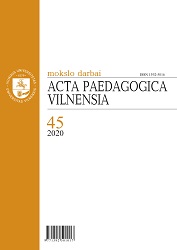Pedagoginės praktikos metu studentų patiriami sunkumai: klausimyno struktūros psichometrinės savybės
Difficulties Experienced by Pre-Service Teachers During Pedagogical Practice: Psychometric Properties of the Questionnaire Structure
Author(s): Tomas Lazdauskas, Albina SaikauskienėSubject(s): Vocational Education, Psychoanalysis, Human Resources in Economy
Published by: Vilniaus Universiteto Leidykla
Keywords: hierarchical cluster analysis; ICLUST; pedagogical practice; pre-service teachers;
Summary/Abstract: The aim of our study was to describe the psychometric properties of the structure of a questionnaire designed to assess the difficulties experienced by pre-service teachers during their pedagogical practice. The study involved 110 pre-service teachers (university students): 96 women and 14 men, with a mean age of 24,28 years (SD = 5,03). Based on our previous research, a set of 20 items was developed asking students to rate their experience on a five-point scale. The hierarchical items cluster analysis algorithm ICLUST was used to test the psychometric characteristics of the questionnaire structure. The analysis was performed according to Revelle’s guidelines. Due to the ordinal nature of items, the cluster analysis was performed on the basis of a polychoric correlation matrix. The statistical analysis was carried out using the psych package in R. The reliability of the clusters was assessed taking into account Cronbach’s alpha and Revelle’s beta indicators. Cluster fit, pattern fit, and RMSR were selected as model fit indicators. Two models were developed: the seven-cluster model and two-cluster model. The seven-cluster model consisted of the following clusters: search and selection of material (K1; α = 0,75, β = 0,75), selection of teaching methods (K10; α = 0,77, β = 0,69), classroom management (K13; α = 0,81, β = 0,72), lack of subject and pedagogical knowledge (K3; α = 0,67, β = 0,67), emotions (K4; α = 0,75, β = 0,75), time management (K12; α = 0,70, β = 0,62), and organizational difficulties (K11; α = 0,66, β = 0,60). The two-cluster model consisted of the following clusters: search and selection of material (K1; α = 0,75, β = 0,75) and general difficulties (K18; α = 0,85, β =0,75). Combining 20 items into seven clusters allowed to achieve the best psychometric characteristics of the questionnaire and to reliably assess the difficulties experienced by pre-service teachers during their pedagogical practice. The characteristics of the two-cluster model were satisfactory, and the 18-items general difficulty scale of this model can be chosen as an alternative to calculate the overall estimate of the difficulties experienced by pre-service teachers during their pedagogical practice.
Journal: Acta Paedagogica Vilnensia
- Issue Year: 2020
- Issue No: 45
- Page Range: 203-215
- Page Count: 13
- Language: Lithuanian

